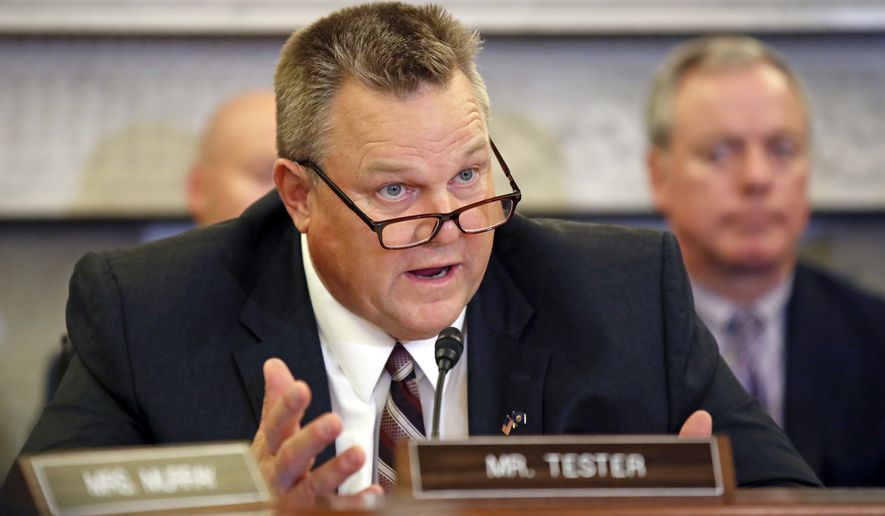Democrats scored a major symbolic victory Wednesday when they won a Senate vote to overturn new IRS rules meant to shield some nonprofits from having to disclose their donors, in what was the first post-election skirmish over liberals’ plans to tighten campaign finance restrictions.
The new rules had been put in place to protect the privacy of people who give to labor unions and social welfare nonprofits, after high-profile incidents in which the IRS had leaked their information in violation of federal laws.
But opponents said the rules might create openings for foreigners or wealthy Americans to quietly direct money to organizations that play a role in U.S. politics. They prevailed in a 50-49 vote, with one key Republican joining Democrats to repeal the new IRS rules.
“Americans deserve to know who is trying to influence their votes. The Senate today sent a clear message: dark money has no place in our elections,” said Sen. Dianne Feinstein, California Democrat.
Their effort isn’t likely to go much further than the Senate, with House passage unlikely and a presidential veto waiting in the wings should the measure somehow clear Congress.
But the vote presages what’s likely to be a long series of battles over campaign finance, voter access and other election-related changes pushed by the new Democratic majority that takes the reins of the House in January.
Rep. Nancy Pelosi, House Democrats’ leader, has already announced the top priority for her chamber will be a package of measures aimed at restoring the Voting Rights Act, forcing disclosure of the president’s tax returns, public financing of campaigns and more extensive disclosure of donors.
Republicans were dismayed by their defeat Wednesday, though they were counting on their counterparts in the House — still GOP-controlled for the rest of the year — to derail it.
“I am confident this effort will not become law,” said Sen. Orrin G. Hatch, Utah Republican.
The IRS released the new rules in July, saying that henceforth, trade associations and social welfare nonprofits organized under section 501(c)(4) of the tax code would no longer have to report their donors on their annual tax forms.
The IRS said charities already didn’t have to report the information, and the agency said it made no use of donors’ names anyway. Besides, the information is supposed to be kept secret within the agency, so there was never going to be public disclosure.
But the agency said collecting it risked “inadvertent disclosure” and not having it at all would prevent that.
Mr. Hatch said those kinds of disclosures have happened at least 14 times this decade alone. He called that a “direct threat to First Amendment rights.”
The IRS said even under the new rules, organizations needed to save their donor information and the tax agency said it could still ask to see it during an audit or investigation.
Democrats, though, said they still wanted the IRS to collect the information anyway, saying it might discourage some mischief. They said if the old IRS policy of secret disclosure wasn’t working, the answer isn’t ending the reporting, but rather more sunshine.
“This is about transparency. Tell me one time — one time — transparency isn’t a good thing?” said Sen. Jon Tester, the Montana Democrat who led the push.
He foresaw an enemy foreign government intent on interfering with U.S. elections donating money to a social welfare group. Under IRS rules, 501(c)(4) groups are able to engage in some political activity as long as they’re not directly funneling money to candidates, and as long as the activity is less than half of the group’s work.
“When you don’t know who’s contributing the money, how do we know it’s not the Russians?” Mr. Tester said.
He and fellow Democrats were harnessing the Congressional Review Act, known informally as the congressional veto, which gives Capitol Hill a chance to overturn new rules and regulations issued by the administration.
It takes only a majority vote in both chambers to clear the veto — meaning Democrats did not need to overcome a GOP filibuster.
Wednesday’s vote was touch-and-go, and Democrats were wooing several Republicans on the floor.
One, Sen. Jeff Flake, waved off entreaties — but Ms. Collins engaged with Sen. Ron Wyden, a key backer of the effort to overturn the IRS rules. She then talked with GOP leaders, before casting what turned out to be the decisive vote with Democrats.
One Republican, Sen. Thom Tillis of North Carolina, was absent, giving Democrats and Ms. Collins their 50-49 advantage.
The vote was a rare victory for Democrats in the years since the 2010 Supreme Court decision in Citizens United, which ruled past restrictions on interest groups’ spending on political communications violated the First Amendment.
Some Democrats have proposed a constitutional amendment to overturn that ruling, but that’s a long shot. Party leaders are instead focused on trying to nibble at the edges, such as forcing groups to publicly disclose donors whose money is used for political activities, and tighten rules on when companies are considered “foreign” for purposes of making them ineligible to play a role in campaign politics.
• Stephen Dinan can be reached at sdinan@washingtontimes.com.




Please read our comment policy before commenting.